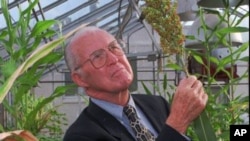"Feed the Future" is a U.S. government initiative which aims to attack the root causes of global hunger through accelerated agricultural development and improved nutrition. The Initiative seeks to catalyze agricultural-led growth by raising the incomes of the poor, increasing the availability of food and reducing undernutrition through sustainable development.
Speaking at a ceremony to announce the winners of the 2010 World Food Prize, Secretary of State Hillary Clinton said that "Feed the Future is central to U.S. foreign policy today."
"We want to strengthen every link in the farming chain from improving the seeds that farmers plant in their fields, to helping create thriving food markets, to promoting nutrient-rich crops so people get the nourishment that they need to thrive, especially mothers and children."
Secretary of State Clinton then announced the creation of the Norman Borlaug Commemorative Research Initiative. This is a cooperative venture of the U.S. Agency for International Development, or USAID, and the U.S. Department of Agriculture. The two agencies will combine their resources, knowledge, commitment and expertise to work together for the common goal of reducing hunger and poverty.
To pay for this initiative, the Department of State has requested a nearly 50 percent increase in funding for international agricultural research in 2011.
Already, U.S. scientists are partnering with counterparts in other countries to develop technologies such as drought and disease resistant seeds of staple crops and rice that will flourish even when submerged in water, or conversely, rice that keeps growing though long droughts. They are to working develop a vaccine for East Coast Fever, a disease which kills a million cattle every year in Africa, and finding new ways to keep livestock healthier.
The new initiative bears the name of Norman Borlaug, U.S. agronomist and Nobel Prize laureate who is considered to be the father of the Green Revolution. His work saved over a billion people from starvation.
"We asked ourselves not whether we can end hunger but whether we will," said Secretary of State Clinton, "because we think it truly is a matter of political will and capacity. . . . And we hope [this new venture] continues to honor Dr. Borlaug’s life’s work."
Borlaug's Legacy Lives On

Secretary of State Clinton announced the creation of the Norman Borlaug Commemorative Research Initiative.












